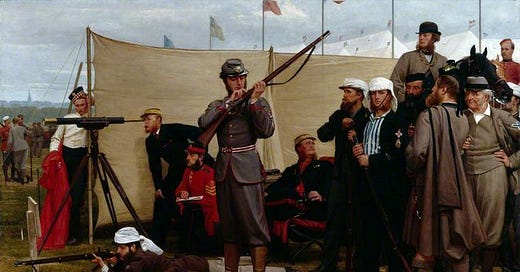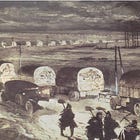Robert T. Foley “Dumb Donkeys or Cunning Foxes? Learning in the British and German Armies during the Great War” International Affairs, March 2014
Foley compares the very different patterns of innovation he observes in the British and German Armies of the First World War. He concludes that, while all of the significant innovations that took place within the British Army were the result of openness to the ideas of civilians, the major innovations carried out by the German Army were the work of soldiers working within the boundaries of the profession of arms.
Nicholas Murray “Officer Education: What Lessons Does the French Defeat in 1871 Have for the US Army Today?” Small Wars Journal (14 January 2013)
Murray provides brief descriptions of three different systems of professional military education: those of the French and German armies in the years leading up to the Franco-Prussian War and that of the present-day US Army. In the course of doing this, he argues that the features of the French system that contributed to defeat in 1871 play a predominant role in the educational system of the present-day US Army.
Jörg Muth Command Culture: Officer Education in the US Army and the German Armed Forces, 1901-1940, and the Consequences for World War II, (Denton: University of North Texas Press, 2011)
Muth argues that the teaching methods used in various military schools in the years before World War II had a profound impact on the performance of commanders in that conflict. In particular, he argues that much of the tactical skill displayed by commanders was due to the thoughtful use of decision games in military schools.
Martin Samuels “Doctrine for Orders and Decentralization in the British and German Armies, 1885–1935” War in History July 2014
Samuels compares the evolution of two military cultures, one based on the belief that the problems faced by commanders of combined arms formation were necessarily complex problems and another dependent on the assumption that the definitive virtue of such commanders was obedience to the letter of orders received from higher authority.
Martin Van Creveld The Training of Officers (New York: The Free Press, 1990)
Van Creveld argues that curricula based largely on the solution of tactical problems (what we would now call “tactical decision games”) produced soldiers who were highly creative in the realm of tactics, deficient in other aspects of the art of war, and painfully naive about politics. He also argues against the practice of charging military schools with the development of doctrine.
Albert C. Wedemeyer “German General Staff School” (unpublished report, dated 3 August1938, available on line from the Combined Arms Research Library)
Wedemeyer, who spent two years as a student at the Berlin Kriegsakademie, paints a highly detailed picture of instruction at that school. In doing so, he pays a great deal of attention to the tactical decision games that formed the heart of the curriculum.








These are useful. You should do more.